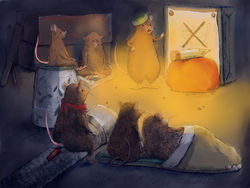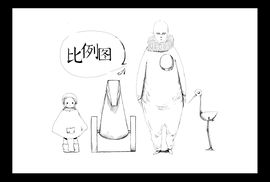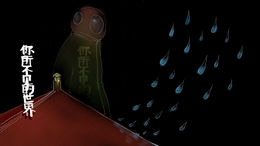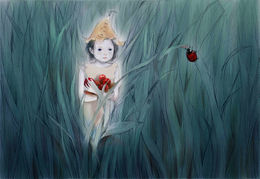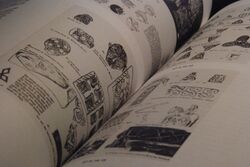User:Chen Junyu/Graduation Project Seminar/project proposal/Proposal2: Difference between revisions
Chen Junyu (talk | contribs) |
Chen Junyu (talk | contribs) |
||
| (71 intermediate revisions by the same user not shown) | |||
| Line 1: | Line 1: | ||
==Project== | ==Project== | ||
The project would be an audiovisual installation, | The project would be an audiovisual installation. There is not specific decision of the image and sound. The sound could be recorded from inside of the plants (maybe) by contact phones, then amplify and synthesis to hearable sound. The image would base on the micro or and detailed construction of plants such as image taken by microscope, by using these images, creating 2d hand-drawing animation out of that. The work would be placed in a dark, half-closed room which provides enough silenced environment. The animation would be projected onto different spots with different scales, height and duration)in the room to build up the feeling of immersion. The path should be flexible for viewer going through, but there will also be a default path in the exhibition handbook. | ||
==Introduction== | ==Introduction== | ||
After the research for EMO(Giants and Little People) | After the research for EMO(Giants and Little People)[http://pzwart3.wdka.hro.nl/wiki/User:Chen_Junyu/graduation/theise/project_proposal/Draft:EMO|EMO] I have slightly moved further with the word "Scale". Since we born in this world, the scale of the world for us is always changing, it changes with the grow and shrink of our physical body, also relies on the understanding or our emotion/feeling to the world. At a macro level, out general understanding of this world is also changing by the time, such as the conversion of public perception from Geocentrism to Heliocentrism or the changing of peoples' feeling to nature presented in the western painting history. | ||
[[File:Lascaux 04.jpg|thumbnail|left|Lascaux Caves]] | [[File:Lascaux 04.jpg|thumbnail|left|Lascaux Caves]] | ||
| Line 15: | Line 9: | ||
[[File:Claude Gellée - Paysage avec la fuite en Égypte.jpg|thumbnail|right|Claude Gellée - Paysage avec la fuite en Égypte]] | [[File:Claude Gellée - Paysage avec la fuite en Égypte.jpg|thumbnail|right|Claude Gellée - Paysage avec la fuite en Égypte]] | ||
Quoted from the English scripts of ''Earth, Sea, and Sky: Nature in Western Art: Masterpieces from The Metropolitan Museum of Art'': From early times, people struggling to understand powerful natural forces imagined them as human in order to mitigate their fear of the unknown. The tradition of personifying nature continues to this day, for example in the practice of giving personal names to hurricanes. | |||
Through advanced technique, there is no doubt that we can obeserve the function of cells which constructs our physical body, monitor every singal moment of a chemical reaction and simulate the process of a black hole having its food. On one hand the scale for measuring the world is gaining its datas, on the other hand, it doesn't bring a big difference on our perception to the world. We still live in the same model of cities or towns designed and built hundred years ago, the scale of buildings or roads didn't experience big difference in the past years. We feel save living in the artificial world, and, we are escaping from or eating out the outside | |||
nature. Maybe only when we stand alone in a wild forest without any human life's evidence, we finally can feel the original fear or the awareness of our tininess as human being did thougsand years ago. | |||
==Relation to previous practice== | ==Relation to previous practice== | ||
When I started thinking the topic of the graduation project, I traced back to my old works before I came to PZI, most of them are illustrations. Then I realised in these drawings, little people or giants, the comparison of the scale between human and other species took a large part. Surely "scale" is an effective factor in different kinds of artwork, especially in drwaings and sculptures, I still wanted to dig out what is the point attracting me so much. | When I started thinking the topic of the graduation project, I traced back to my old works before I came to PZI, most of them are illustrations. Then I realised in these drawings, little people or giants, the comparison of the scale between human and other species took a large part. Surely "scale" is an effective factor in different kinds of artwork, especially in drwaings and sculptures, I still wanted to dig out what is the point attracting me so much. | ||
[[File:Illustration1.jpg|250px]] [[File:Illustration2.jpg|270px]] [[File:Illustration3.jpg|260px]] [[File:插画5.jpg|260px]] | |||
==Relation to a larger context== | ==Relation to a larger context== | ||
'''[ | <big>'''Sound'''</big> | ||
*Jez Riley French | |||
Audible SilenceA sound artist who has spent most of his live on listening to environments. | |||
He recorded a lot of sound from small creatures, such as bees and ants, also creatures in sea such as periwinkles eating sea grass. | |||
"natural composition" {{youtube|i44DDWfkS5I|right}} | |||
*Bernie Krause--Soundscape | |||
[http://tedxtaipei.com/2013/10/bernie-krause-the-voice-of-the-natural-world/ Bernie Krause--the voice of the natural world] | |||
The Soundscape composed by : Geophny Biophony Anthrophony | |||
Through recording sound in landscape, Bernie Krause observes the influence to environment which is caused by urban expansion. | |||
*Raoul Brand | |||
Sound recording inside of a 80ft chestnut tree (contact microphone) | |||
[https://soundcloud.com/raoul-brand/tree-2612/s-2RqA5 sound inside a tree] | |||
<big>'''Visual'''</big> | |||
Microwold's Photography by Daniel Stoupin http://www.microworldsphotography.com/ | |||
The oldest known paintings are the Grotte Chauvet in France, the paintings show horses, rhinoceros, lions, buffalo, mammoth, abstract designs and what are possibly partial human figures. These paintings are thought as the respect for nature, or for the gain of prey | |||
==Practical steps== | |||
In order(All this practical steps are for experimenting the project sound of plants,now I am not sure if I should go further with): | |||
*Working on prototypes for sound/visual, collect and analyse attractive installations,add--reduce. | |||
<br> | |||
Here are some prototypes I made.<br> | |||
<br>[[File:Micro1.jpg|250px]] [[File:3(vase.light from bottom).jpg|250px]] [[File:7.JPG|250px]]<br> | |||
<br>[[File:Microscope1.JPG|250px]] [[File:Microscope2.JPG|250px]] [[File:Microscope3.JPG|250px]] <br> | |||
{{vimeo|111947308}} {{vimeo|112118186}} | |||
==References== | |||
Oliver Grau ''Virtual Art -- From Illusion To Immersion'' | |||
Gyorgy Kepes ''The Nature and Art of Motion'' | |||
Max Luthi ''The Fairytale as Art Form and Portrait of Man' | |||
Dolf Rieser "Art and Science" | |||
[English Scripts]Earth, Sea, and Sky: Nature in Western Art: Masterpieces from The Metropolitan Museum of Art | |||
The | Michael Pollan "The Botany of Desire" | ||
Latest revision as of 10:19, 19 November 2014
Project
The project would be an audiovisual installation. There is not specific decision of the image and sound. The sound could be recorded from inside of the plants (maybe) by contact phones, then amplify and synthesis to hearable sound. The image would base on the micro or and detailed construction of plants such as image taken by microscope, by using these images, creating 2d hand-drawing animation out of that. The work would be placed in a dark, half-closed room which provides enough silenced environment. The animation would be projected onto different spots with different scales, height and duration)in the room to build up the feeling of immersion. The path should be flexible for viewer going through, but there will also be a default path in the exhibition handbook.
Introduction
After the research for EMO(Giants and Little People)[1] I have slightly moved further with the word "Scale". Since we born in this world, the scale of the world for us is always changing, it changes with the grow and shrink of our physical body, also relies on the understanding or our emotion/feeling to the world. At a macro level, out general understanding of this world is also changing by the time, such as the conversion of public perception from Geocentrism to Heliocentrism or the changing of peoples' feeling to nature presented in the western painting history.
Quoted from the English scripts of Earth, Sea, and Sky: Nature in Western Art: Masterpieces from The Metropolitan Museum of Art: From early times, people struggling to understand powerful natural forces imagined them as human in order to mitigate their fear of the unknown. The tradition of personifying nature continues to this day, for example in the practice of giving personal names to hurricanes.
Through advanced technique, there is no doubt that we can obeserve the function of cells which constructs our physical body, monitor every singal moment of a chemical reaction and simulate the process of a black hole having its food. On one hand the scale for measuring the world is gaining its datas, on the other hand, it doesn't bring a big difference on our perception to the world. We still live in the same model of cities or towns designed and built hundred years ago, the scale of buildings or roads didn't experience big difference in the past years. We feel save living in the artificial world, and, we are escaping from or eating out the outside nature. Maybe only when we stand alone in a wild forest without any human life's evidence, we finally can feel the original fear or the awareness of our tininess as human being did thougsand years ago.
Relation to previous practice
When I started thinking the topic of the graduation project, I traced back to my old works before I came to PZI, most of them are illustrations. Then I realised in these drawings, little people or giants, the comparison of the scale between human and other species took a large part. Surely "scale" is an effective factor in different kinds of artwork, especially in drwaings and sculptures, I still wanted to dig out what is the point attracting me so much.
Relation to a larger context
Sound
- Jez Riley French
Audible SilenceA sound artist who has spent most of his live on listening to environments. He recorded a lot of sound from small creatures, such as bees and ants, also creatures in sea such as periwinkles eating sea grass. "natural composition"
- Bernie Krause--Soundscape
Bernie Krause--the voice of the natural world The Soundscape composed by : Geophny Biophony Anthrophony Through recording sound in landscape, Bernie Krause observes the influence to environment which is caused by urban expansion.
- Raoul Brand
Sound recording inside of a 80ft chestnut tree (contact microphone) sound inside a tree
Visual
Microwold's Photography by Daniel Stoupin http://www.microworldsphotography.com/ The oldest known paintings are the Grotte Chauvet in France, the paintings show horses, rhinoceros, lions, buffalo, mammoth, abstract designs and what are possibly partial human figures. These paintings are thought as the respect for nature, or for the gain of prey
Practical steps
In order(All this practical steps are for experimenting the project sound of plants,now I am not sure if I should go further with):
- Working on prototypes for sound/visual, collect and analyse attractive installations,add--reduce.
Here are some prototypes I made.
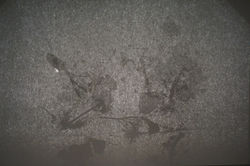
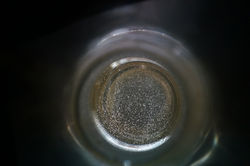
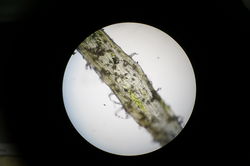
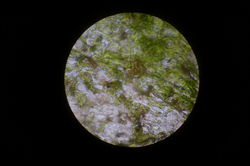
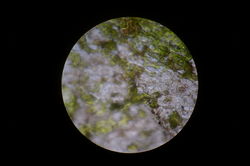
References
Oliver Grau Virtual Art -- From Illusion To Immersion
Gyorgy Kepes The Nature and Art of Motion
Max Luthi The Fairytale as Art Form and Portrait of Man'
Dolf Rieser "Art and Science"
[English Scripts]Earth, Sea, and Sky: Nature in Western Art: Masterpieces from The Metropolitan Museum of Art
Michael Pollan "The Botany of Desire"

